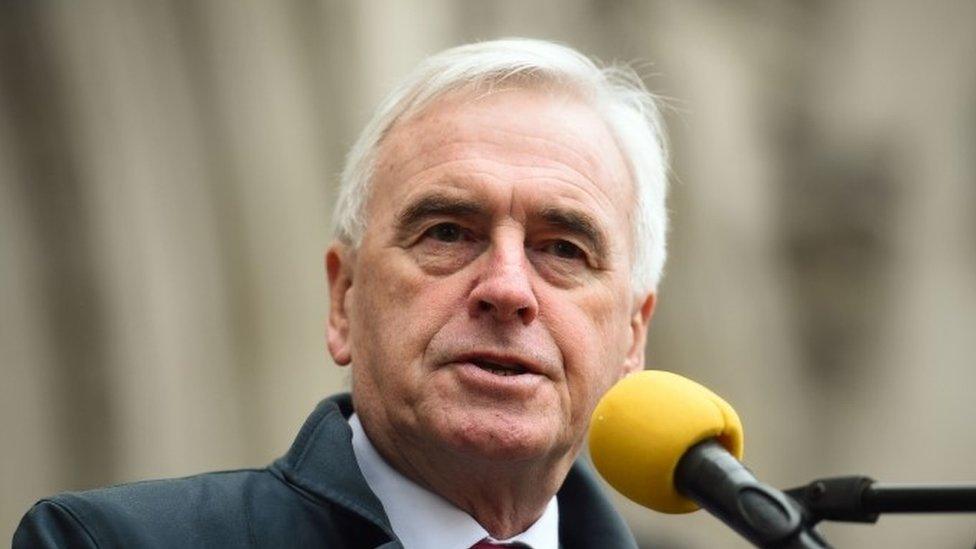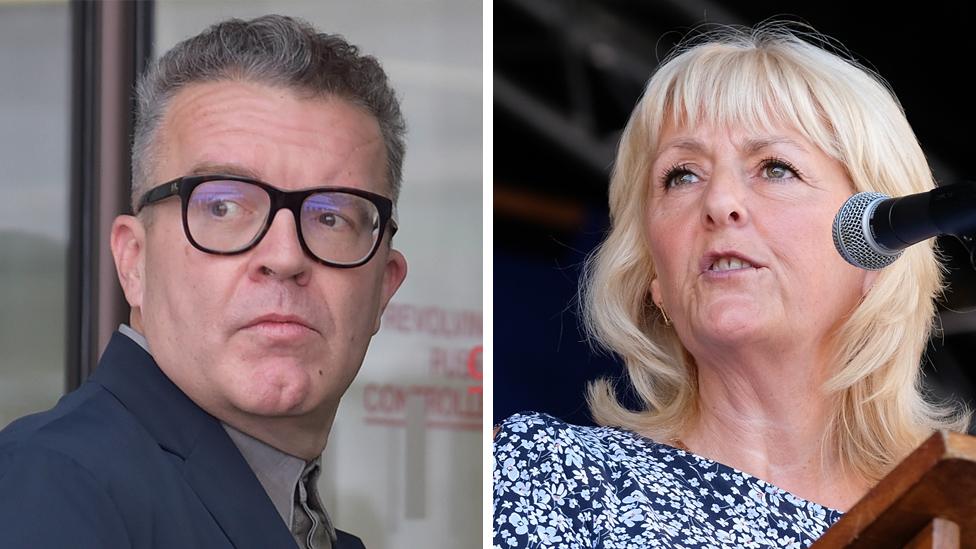Labour anti-Semitism: Tom Watson told to let party boss handle it
- Published

John McDonnell has backed Labour's general secretary Jennie Formby in her row with deputy leader Tom Watson over how to handle anti-Semitism cases.
Ms Formby has accused Mr Watson of "unacceptable" behaviour by asking MPs to forward anti-Semitism complaints to him as well as the party.
Shadow Chancellor Mr McDonnell said: "That wouldn't be right. This has got to be dealt with by the party itself."
Mr Watson has claimed a "loss of trust" in the party's processes.
He hit back at Ms Formby's claim he was trying to "undermine" her work, by saying: "It is my responsibility as deputy leader of the Labour Party to ensure people have confidence in our complaints system and our ability to deal transparently with the scourge of anti-Semitism."
Ms Formby - a former Unite union official - is the most senior employee of the Labour Party and is in charge of its 400 or so backroom staff.
'Clearly a problem'
She is seen as a close ally of the Labour leadership and Len McCluskey, the leader of Unite, which is Labour's biggest financial backer.
Mr Watson has claimed in the past that Unite is engaged in a takeover of the party, and is "coming for me" as Labour's deputy leader, a position chosen by a vote of party members.
John McDonnell stepped into the latest spat between the two factions, by saying "clarity" was needed from Mr Watson on how he saw his role in tackling anti-Semitism.
"There is no problem about asking for information about progress on individual cases if you've reported them," said Mr McDonnell.
But he added: "What you don't want is individual politicians in particular getting involved in setting up some form of parallel process."

Tom Watson was accused of undermining party processes by Jennie Formby
He also rejected suggestions that Labour is institutionally anti-Semitic, although he acknowledged there is "clearly" a "problem" within the party and it had to be "more ruthless, more severe" in dealing with it.
Former justice secretary Lord Falconer is, meanwhile, expected to lead a review of Labour's handling of anti-Semitism cases.
The former Labour cabinet minister said he wanted to look at whether the party was institutionally anti-Semitic - and hoped to produce a report in "months not years".
He said he did not think Jeremy Corbyn was an anti-Semite personally, but members of the Jewish community had made it clear they have "absolutely no confidence" in the Labour leader to adequately fight anti-Semitism.
Lord Falconer said he also wanted restore faith in Labour's disciplinary procedures, saying many Labour members believed the outcome of cases depended on "who your friends are".
'Too much ground'
He told BBC Radio 5's Pienaar's Politics he would "probably" not have taken on the role if MP Chris Williamson had not been suspended by the party.
Mr Williamson, a close ally of Mr Corbyn, was suspended on Wednesday for saying the party had been "too apologetic" on anti-Semitism.
The Derby North MP said Labour had "given too much ground" in the face of criticism over the issue but later said he "deeply regrets" the remarks.
He told BBC News he was "absolutely determined" to clear his name and did not want anyone to think he was "minimising the cancer of anti-Semitism".
But grassroots Labour activists in several local party branches have called for him to be reinstated, saying his comments had been taken out of context by opponents of Jeremy Corbyn who are wrongly trying to brand the party anti-Semitic.
Meanwhile, The Observer reported that internal documents, external showed senior Labour figures last year opposed recommendations to suspend several party activists accused of anti-Semitism.
A Labour Party spokesman said: "Any suggestion that staff in the Leaders' Office opposed recommendations on individual cases is categorically untrue."